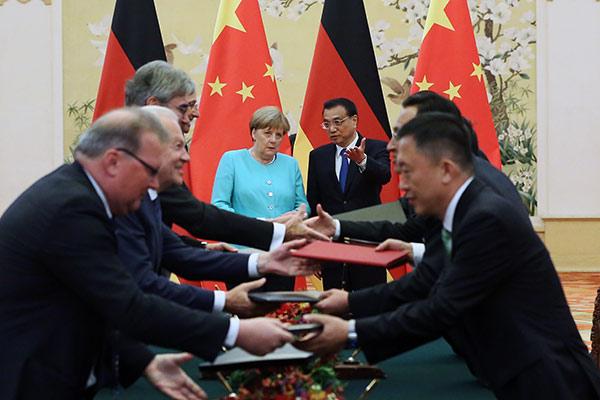
Premier Li Keqiang and German Chancellor Angela Merkel attend a signing ceremony at the Great Hall of the People in Beijing, June 13, 2016.[Photo/China Daily]
‘We can work together’ to tackle problems such as steel, Premier tells German leader
China and Europe should collaborate constructively to resolve trade conflicts, such as excess capacity of iron and steel products, Premier Li Keqiang told a news conference on June 13.
Premier Li was referring to the European Union’s complaints that China is selling its excess iron and steel to the region, a topic in the spotlight during the visit by German Chancellor Angela Merkel on June 13.
“Overcapacity of iron and steel is a global problem, not China’s alone. We should separate trade conflicts between China and the EU from the bilateral trade, as the conflicts are a very small part of trade,” Premier Li said. “Chancellor Merkel and I have agreed not to expand and complicate trade conflicts,” he added. “We can work together frankly toward the same direction to properly tackle conflicts and increase common interests.”
The Premier also said China doesn’t want a trade war because that wouldn’t benefit any country amid the sluggish global economy.
Premier Li and Merkel co-chaired a meeting of the China-Germany Economic Advisory Committee on June 13 to meet with enterprises from both countries.
Last year, only 7 percent of China’s production of iron and steel was exported to other countries, far lower than that of countries such as South Korea and Japan, said Chen Derong, general manager of Baosteel Group, which is based in Shanghai. He dismissed the idea that China dumped cheap goods in Europe.
“I hope the EU can loosen restrictions on Chinese iron and steel products. The EU also subsidized iron and steel companies during the crisis in the 1970s,” Chen said.
China’s iron and steel industry is on a pace with the European producers’ output in the 1970s, he said. European countries began to subsidize iron and steel companies 40 years ago, but the industry has waned in accordance with market demand, Chen added.
He said Germany should exert its influence on the EU to loosen or cancel trade limits on Chinese iron and steel exports.
The German steel maker ThyssenKrupp said at the meeting that the global overcapacity of iron and steel cannot be resolved without China’s participation and that it will take time to solve the problem.
Entrepreneurs’ forum brings stronger ties
Top officials from China and Germany are expecting further cooperation among entrepreneurs to create win-win results following a high-level forum on June 13.
A total of 96 contracts and cooperation agreements totaling more than $15 billion were signed by business partners at the eighth Chinese-German Forum for Economic and Technological Cooperation on June 13.
Leading companies in the electronics, new energy and education industries signed agreements or pacts.
Premier Li Keqiang said that the two countries should strengthen cooperation on an equal basis and seek to open markets and reduce restrictions that prevent companies from making investments.
German Chancellor Angela Merkel said that the increasingly close German-Chinese economic relationship provides enormous opportunities to cooperate while adopting similar strategies for the industrial process, namely Made in China 2025 and Germany’s Industry 4.0.
